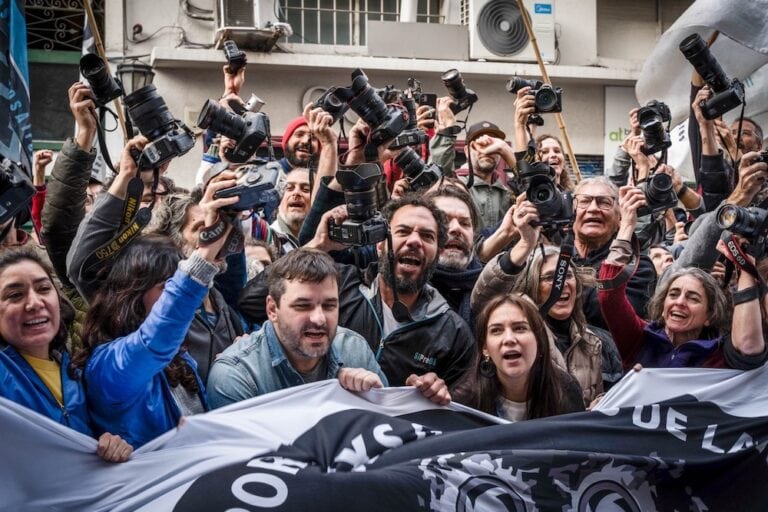IFEX speaks to the co-founder of "Presentes" about Latin American gender policies, stigmatising coverage and conservative pressures.
Attacks, threats, assassinations. Social and police repression. Stigmatisation or direct marginalisation of their issues and visions. This is the difficult reality confronting LGBTQI+ groups in the Americas, especially in Latin America where the levels of discrimination and censorship of these minorities translate into attacks and harassment on a daily basis. Added to the violence is the issue of the impunity enjoyed by those who commit these crimes.
Against this backdrop, journalists Ana Fornaro and María Eugenia Ludueña founded “Presentes”, an independent, digital media outlet geared to highlighting issues of gender identity, sexual diversity and the demands and voices of LGBTQI+communities in Latin America in an impartial and non-stigmatising manner.
“We play an important role,” says Fornaro, who becomes animated when talking about the project and its mission. “We are putting issues on the agenda that the mainstream media fails to cover.”
For the journalist, there exists a “conservative front” running contrary to the gender and freedom of expression ideologies of LGBTQI+ groups. As such, “Presentes” brings a regional focus in order to journalistically challenge this conservative front.
“Activism at this point is crucial, but journalism is also key: reflecting what is happening, telling people’s stories, amplifying their voices, fostering debate. That is our task and mission every day,” says Fornaro.
“Presentes”, which completed its first year of publication on 24 November 2017, is based in Argentina but relies on correspondents from several countries in the region. According to Fornaro, there is a tremendous amount of work to be done as the media outlet not only provides professional coverage, but also seeks to provide education on how to approach the issues.
The “Presentes” founders seek to employ journalistic best practices and end the discrimination that exists in coverage of LGBTQI+ topics. For this reason, they have carried out training sessions and are planning to release a style manual for coverage of the topics.
How did “Presentes” come to exist?
The idea came about last year. Part of our team was working for a government agency called Noticias. This agency worked on justice and human rights issues under the auspices of the National Ministry of Justice. But the programme was shuttered when President Macri came to power as it was extremely critical of the current judiciary and was highly aligned with the previous government.
Finding ourselves without work, together with Maru Ludueña and another colleague we contemplated launching a journalistic project focusing specifically on sexual diversity issues from a human rights perspective, and with a regional focus. “Presentes” came about from those discussions. We launched with the support of the Copadi NGO (a collective for diversity).
We realized that these are issues that are not seen as important by many and are not systematically covered by the media. As such, if they are not brought forward they will be left off the agenda.
On the question of a regional focus, we saw that this is generalised problem throughout Latin America. There have been advances, but there is also a conservative front running contrary to these advances in several countries. There are powerful and affluent conservative elements that are mounting a very strong resistance. These include some evangelical churches, not to mention the Catholic Church, that are against “gender ideologies”. As such, we felt it important for us to approach the issues from a regional perspective and ensure that voices from various countries would be heard.
We obtained financing for the project from outside Argentina because the journalism situation in the country is pretty messed up. The first thing we did was to set up a network of correspondents in Peru, Chile, Paraguay and Honduras. We launched online on 24 November 2016, on the same day as a demonstration against murders of transvestites in Argentina.
We chose this as a symbolic launch date since gender violence is one of the most important issues for which we want to raise awareness. The life expectancy of trans people in Latin America is just 35 years.
What is your evaluation of this first year?
Our team is very tiny, two multipurpose directors and one other person, and beyond that, we rely on collaboration with others. The fact that our team is so small has made this year challenging because a self-managed media outlet carries with it many responsibilities, along with little financial backing.
We also worked within the very demanding framework of breaking news, which makes it more exhausting. This was a political decision: if journalistic coverage operates within this framework on other topics, then the issues we are addressing must be no different, they have the same urgency.
It has been an incredible year, but also a year of much, much effort. We are a tiny team faced with a gigantic task.
Being one of the only media outlets focused on issues of gender and human rights in the region must carry with it a workload that just keeps increasing….
There is a deluge of complaints. Our links with LGBTQI+ social organisations are of key importance as they represent our primary sources of information. Keeping these relationships well-oiled is a job in itself as every organisation has its own position. For us it is a challenge to provide space to all of them.
We have a policy of publishing articles based on at least two sources, which is a basic tenet of journalism often not respected in coverage of these issues.
How do you manage the increase in influence that comes with being such an issue-specific media outlet?
With education. In addition to having the website and carrying out journalism on a daily basis, our mission is to reach a point where what we are doing has an impact on the broader journalistic agenda, and for what we are doing to serve in some way such that journalists who do not currently cover these topics begin to approach them in a less discriminatory fashion. It is not just a matter of covering what is happening. We also want to assist in changing the way coverage of these issues is carried out.
In order to achieve this goal, we conducted three workshops with more than 300 registrants, and we are putting together a guide covering journalistic best practices on these issues. The topics we focus on are not generally covered by journalists and, since they are not part of the general agenda, when they do come out in the news the coverage is done in a very poor manner.
It is not just an issue of using inclusive language, it also relates to the focus of the news. The assassination of a trans person is always presented in a sensational manner and not as it should be: as an attack on human rights and a gender crime. The victim is not discussed, and if they are discussed it is in a stigmatising manner.
When the major media outlets touch on these issues they usually do so in a discriminatory manner. As such our mission is two-fold: on one hand, to provide coverage of the issues, bringing them to light in the best way possible, and, on the other hand, to serve as input, including in training journalists, in order to have an impact on coverage beyond what we do at “Presentes”. This is most important in the long run, ending with discrimination in the coverage of these issues.
What criteria did you use to select the countries where you have correspondents?
With our limited resources, we selected the countries that, in our opinion, have the most problems regarding equal rights. In Paraguay, for example, everything is very regressive. It is a country where citizens have few rights and there is a high level of violence, especially toward transvestites and trans people, who constitute the most vulnerable group.
In Peru there have also been setbacks, many of them stemming from the Fujimorist caucus in Parliament, which eliminated several articles linked to gender. There is a tendency from the right to want to repeal everything having to do with gender.
Yet in some parts of the world there are liberal centre-right movements that have broad rights agendas. How are these combined?
Being left or right-leaning does not provide guarantees of the positions one will take on these issues. It is true that, in general, the more progressive governments have followed a rights agenda a little more, but often as a result of being pushed or forced to do so by pressure from social organisations.
The difference is that the liberal right, although they may have a gender-identity agenda and be in favour of equal marriage, fails to promote real public policy changes within government. It is one thing to look at what is or is not being promoted or enacted at the legislative level, and it is another thing to look at where resources are allocated and for what types of public policies that have a real impact in the lives of these people.
We talk about it being great that homosexual individuals can marry each other, but at the same time transvestites and trans people are still on the streets, with no access to health care, and the government decides not to invest in them. This is what is happening in Argentina under the Macri government. On one hand there is this amazing and advanced legislation that is a model for the rest of the world. In addition, you have government discourse that sounds very “gay-friendly” and there is a diversity week supported by the Buenos Aires municipal government.
If you do not live in Argentina and you see this, you would say “great government”, but the same government continues to close programmes that are important for LGBTQI+ communities and it gives the police free reign in being repressive.
How do you visualise the rights of these communities to freely express themselves? What role can “Presentes” play in this objective and how can improvements be achieved?
The free expression rights of these communities are tested every day. And it is not just about the ability to speak out, but the right to be, to exist, to move freely on the streets with their identities without being subjected to violence or discrimination. As such, I understand freedom of expression in a broad sense, not just at the journalism level.
“Presentes”, along with other media outlets that emphasise sexual diversity from a human rights perspective, all play an important role, as we raise awareness, investigate and deepen understanding, putting issues on the agenda that the mainstream media fails to cover. And it is fundamental that the voices be from the communities, not “speaking for” the communities. Our sources have to be the protagonists. This is a key focus for us.
What remains to be done in order to achieve genuinely equal rights in Latin America?
We are very far from achieving equal rights in Latin America. There have been legislative level advances in particular countries, but with strong resistance from some groups. It is not about “tolerance” or “equality”. It is crazy that we keep having the same discussions, that we keep having to demand basic things, like access to education and work, and respect for self-determined identity. It is crazy that trans people are being killed simply for being trans. It is not being reductionist to say these are hate crimes. Because of this I am not at all optimistic.
Activism is crucial right now, but journalism is also key: reflecting what is happening, telling people’s stories, amplifying their voices, fostering debate. That is our task and mission every day.



